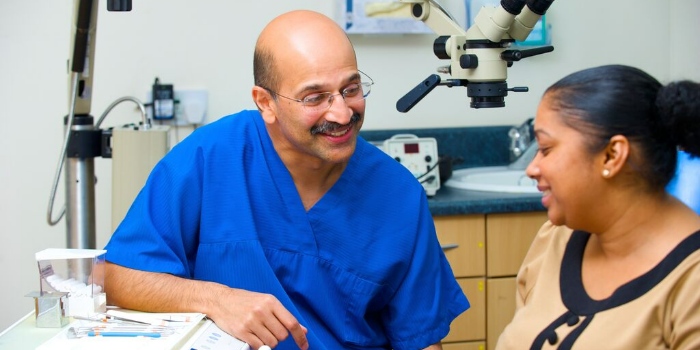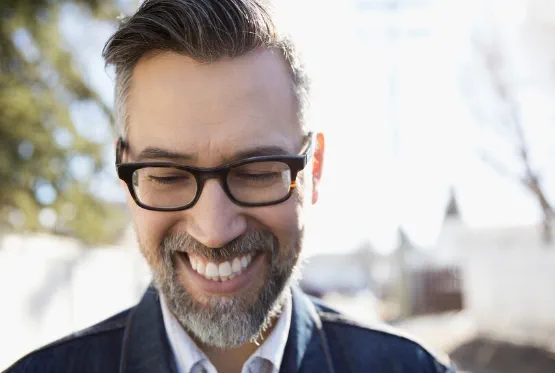Your top dental questions answered
Are you curious about teeth whitening? Or wondering how often you should floss? Perhaps you’re struggling with sensitive teeth, or would like to know what fluoride is? In this article, I answer some common dental questions to help you learn more about keeping your teeth healthy.

What is the best way to whiten my teeth?
If you’d like brighter teeth, you might be looking into ways to whiten them. Despite the claims of many products, the only safe and effective way to whiten your teeth is by visiting your dentist.
Your dentist can provide a whitening treatment in the practice. Or they can prescribe you a treatment to use at home under their guidance.
It’s important to only go to your dentist for teeth whitening. This is because it can be dangerous to use products that aren’t prescribed by your dentist. They can contain harmful chemicals that can damage your teeth.
What is the main reason for tooth decay?
When we eat sugary foods or drinks, the bacteria in our mouth produce acids. Over time, these acids can break down our teeth causing holes or cavities.
Smoking cigarettes can also increase your risk of tooth decay. Smoking can affect your ability to fight off infections. This can make it easier for bacteria in your mouth to form and become dental plaque (a coating that forms on your teeth made up of bacteria). The best way to prevent tooth decay is to:
- brush your teeth twice a day
- limit the amount of sugary foods and drinks you have
- stop smoking if you smoke
- attend your regular dental check ups
- drink no more than 14 units of alcohol per week
Is fluoride good or bad for you?
Fluoride is a natural mineral found in water, soil and some foods. Some areas have more fluoride in the water supply than others, either naturally or because fluoride is added to the water.
It helps to keep our teeth healthy and reduce tooth decay. Fluoride is a key ingredient in toothpaste for this reason, and helps to prevent caries (small holes) forming in our teeth.
It’s important that young children don’t have too much fluoride. So always choose a toothpaste that’s appropriate for their age. If young children have too much fluoride, it can cause fluorosis (when marks form on their teeth). Follow the instructions on the toothpaste packet about how much to put on their toothbrush. The benefits of using a toothpaste with fluoride in, outweigh the small risk of fluorosis when used carefully.
Always supervise how much toothpaste young children are using when brushing their teeth.
What is the best type of toothbrush to use?
You should use a toothbrush with a small or medium sized head, with soft to medium bristles made from nylon. Some people find an electric toothbrush easier to use. Electric toothbrushes with heads that rotate and move position are the most effective at cleaning your teeth.
Some toothbrushes also have timers built in to let you know when to move the brush to another part of your mouth. Some come with timers to let you know when you’ve brushed for long enough (around two minutes).
For young children, choose a toothbrush with a small head and soft nylon bristles. Different toothbrushes are suitable for different ages, so look for the recommended age on the packet.
How often should I floss?
Alongside brushing your teeth twice a day, it’s important to clean between your teeth to keep your teeth and gums healthy. Interdental cleaning helps to remove food particles from between your teeth that can be missed by your toothbrush.
It’s recommended that we clean between our teeth, alongside brushing, once a day. There are lots of different ways to do this, such as dental floss picks, floss tape, interdental brushes and water flossers. So, find a type that suits you best.
Flossing can be more difficult if you have braces, so ask your dentist what type of floss they would recommend.
Why are my teeth sensitive?
Tooth sensitivity can develop at any time. It can happen when dentine (the substance that covers the root surface of our teeth) becomes exposed, or it can be due to tooth decay. You might notice sensitivity when eating something hot or cold. Common causes include:
- tooth grinding
- brushing your teeth too hard
- receding gums (when the gum shrinks back from your teeth)
- erosion of your enamel from acidic foods and drinks like citrus fruits and fizzy drinks
Speak to your dentist if you’re teeth have suddenly become sensitive, or if you’re struggling with tooth sensitivity.
Are you interested in learning more about your health? Discover more about our range of health assessments.
-
Sources Sources
- Teeth whitening. British Dental Association (BDA). Bda.org. Last accessed 28 March 2025
- Health matters: child dental health. Public Health England. Gov.uk. Published 14 June 2017
- Smoking and oral health. Ash Scotland. Taking Action on Smoking and Health. Ashscotland.org.uk. Last accessed April 2025
- Plaque definition. Cambridge dictionary. Dictionary.cambridge.org. Accessed 28 March 2025
- Smoking and oral health. Oral Health Foundation. dentalhealth.org. Last accessed 28 March 2025
- Health and Care Bill: water fluoridation. Department of Health & Social Care. Gov.uk. Last updated 10 March 2022
- Dental Fluorosis. The British Fluoridation Society (BFS). Bfsweb.org. Last accessed 28 March 2025
- Chapter 9: Fluoride. Office for Health Improvement & Disparities. Department of Health & Social Care. Gov.uk. Last updated 9 November 2021
- Oral care products. Oral Health Foundation. dentalhealth.org. Last accessed 28 March 2025
- The ultimate guide to flossing. Patient. Patient.info. Published 21 June 2023
- Varga G, Kerémi B, Bori E, Földes A. Function and repair of dental enamel - Potential role of epithelial transport processes of ameloblasts. Pancreatology. 2015 Jul;15(4 Suppl):S55-60. doi: 10.1016/j.pan.2015.01.012
About our health information
At Bupa we produce a wealth of free health information for you and your family. This is because we believe that trustworthy information is essential in helping you make better decisions about your health and wellbeing.
Our information has been awarded the PIF TICK for trustworthy health information. It also follows the principles of the The Information Standard.

More general health advice articles
Did you find our advice helpful?
We’d love to hear what you think. Our short survey takes just a few minutes to complete and helps us to keep improving our healthy lifestyle articles.
Legal disclaimer
This information was published by Bupa's Health Content Team and is based on reputable sources of medical evidence. It has been reviewed by appropriate medical or clinical professionals and deemed accurate on the date of review. Photos are only for illustrative purposes and do not reflect every presentation of a condition.
Any information about a treatment or procedure is generic, and does not necessarily describe that treatment or procedure as delivered by Bupa or its associated providers.
The information contained on this page and in any third party websites referred to on this page is not intended nor implied to be a substitute for professional medical advice nor is it intended to be for medical diagnosis or treatment. Third party websites are not owned or controlled by Bupa and any individual may be able to access and post messages on them. Bupa is not responsible for the content or availability of these third party websites. We do not accept advertising on this page.






